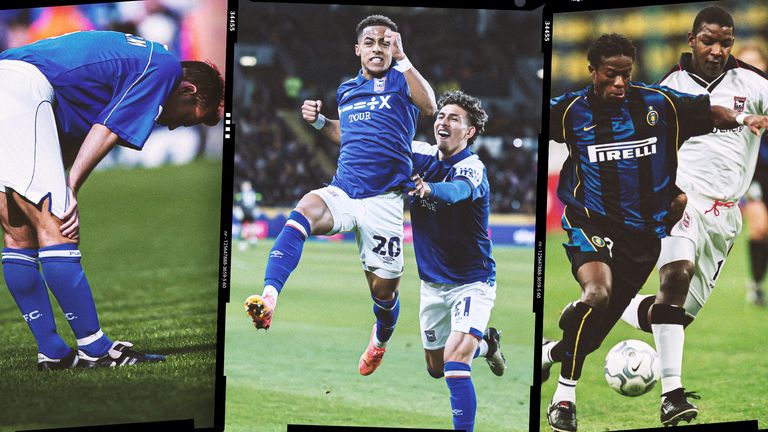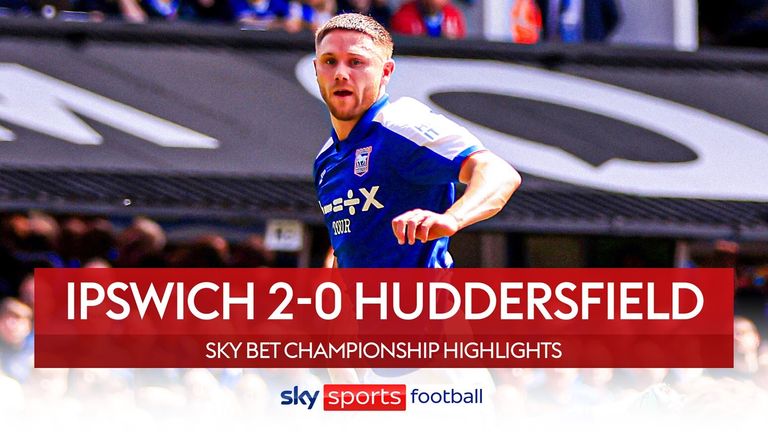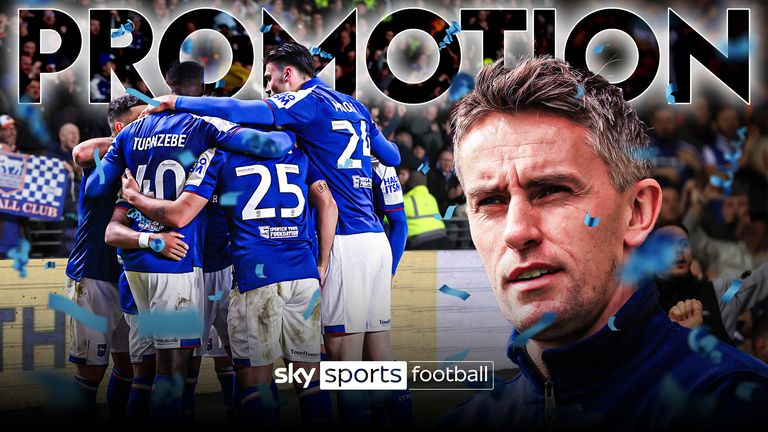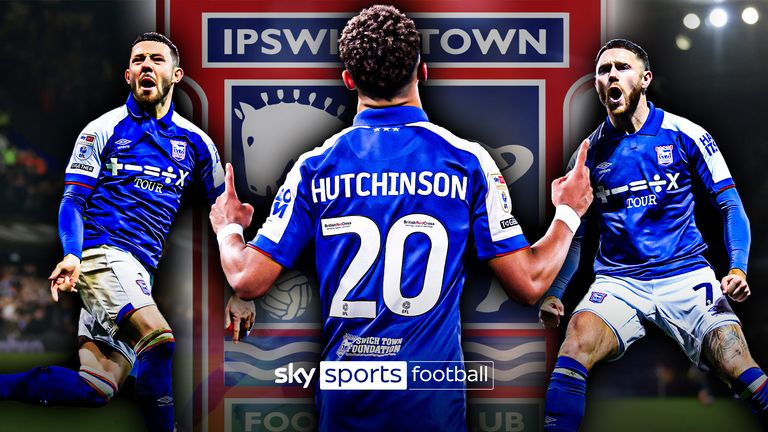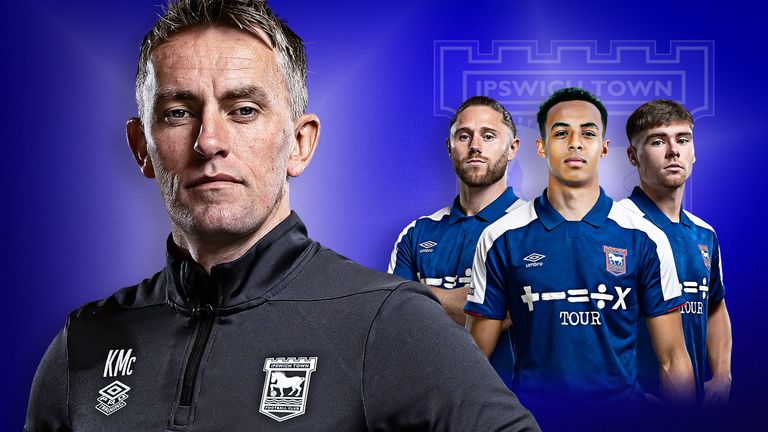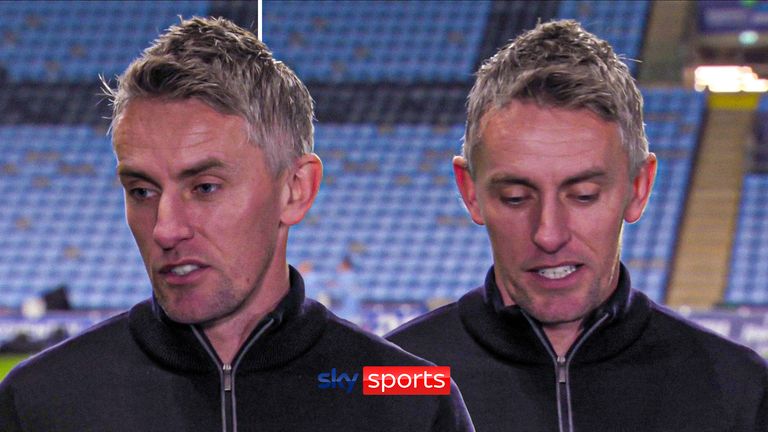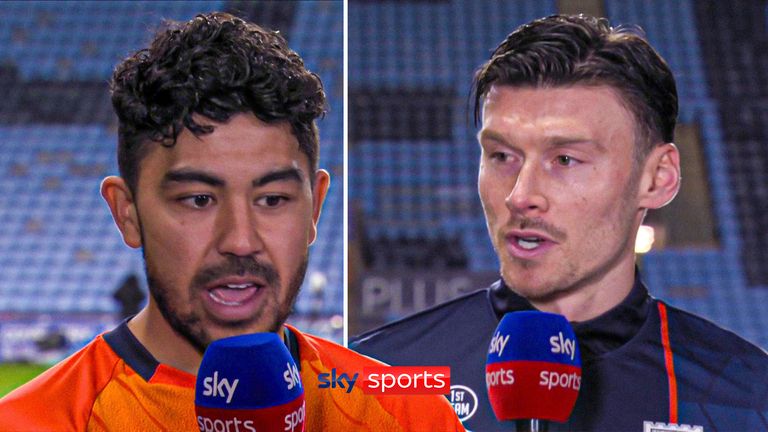Ipswich Town promoted: How Tractor Boys ended 22 years of Premier League exile
Ipswich have ended 22 years of Premier League exile in a way few could have imagined; here is how Kieran McKenna's side did it.
Saturday 4 May 2024 15:27, UK
Saturday May 11, 2002. Ipswich Town are relegated from the Premier League after a crushing 5-0 defeat by Liverpool at Anfield.
It's a level they have rarely come close to returning to since following administration, fleeting play-off disappointments, false dawns under new ownership, a raft of managerial changes and even relegation to the third tier.
But 22 years later, they are back in the Premier League, sealing automatic promotion under Kieran McKenna, and becoming the first side since Southampton in 2012 to achieve back-to-back promotions.
- Ipswich promoted to the Premier League after 22 years away
- Championship fixtures | table | highlights
- Stream the Championship and more with NOW
- Get Sky Sports | Download the Sky Sports App
Few Ipswich fans could have imagined being in this position five years ago when they dropped out of the Championship, finishing bottom of the table at the end of the 2018/19 season after a consolation home win against ironically, Leeds United, the one side who could have denied them second place come Saturday afternoon.
In fact, even more recently than that, the prospect of being back in the Premier League would have seemed fanciful as League Two club Barrow knocked them out of the FA Cup second round in December 2021, days before a certain McKenna was plucked from obscurity to be named their new manager.
Trending
- Isak puts Newcastle in front at the Emirates LIVE! & highlights
- Transfer Centre LIVE! Guehi, Trent, Zirkzee latest
- Man Utd latest: 'Mainoo and Garnacho sales to be reluctantly considered'
- Liverpool latest: Elon Musk owning Liverpool? Have your say!
- West Ham latest: New manager appointment could delay transfer business
- Liverpool not for sale amid claims Elon Musk 'interested' in buying club
- Potter closing in on managerial return with West Ham
- VAR took SEVEN seconds to agree Brighton pen vs Arsenal | Webb: Right call
- Everton latest: Dyche has 'no problem' with club talking to other managers
- Arsenal latest: 'Rosicky a leading contender to take over as sporting director'
Winding the clock back to that Premier League relegation of 2002, just 12 months earlier, Ipswich had incredibly been competing with Leeds and Liverpool for the last remaining Champions League spot as George Burley guided them to a sensational fifth-place finish in 2001.
Qualification for the UEFA Cup followed and Inter Milan were defeated at Portman Road in the first leg of a third-round tie before the Italian giants later prevailed at the San Siro.
But some big-money signings failed to fully click for Burley and the "second season syndrome" bit as just nine league wins saw them eventually finish four points adrift of safety.
A long road back begins with on and off-field turmoil
Burley's long tenure as manager would then come to an end early the following season as initial hopes of an immediate Premier League return quickly diminished when administration struck and a number of key players needed to be offloaded in a fire sale.
Joe Royle took over, but a late run of form could only take Ipswich to seventh place before West Ham denied the Tractor Boys twice in the following two seasons in the Championship play-off semi-finals.
Royle then made way after the end of the 2005/06 season after high-profile names such as Darren Bent, Shefki Kuqi, Tommy Miller and Kelvin Davis had already been sold and with his departure came a period of seemingly endless Championship mediocrity for Ipswich.
Former club captain and fans' favourite Jim Magilton initially struggled to get the side consistent and in contention for promotion, before in spring 2009 a certain Roy Keane arrived in the Portman Road hot seat.
Keane was unable to replicate the formula that had produced an immediate Championship promotion-winning campaign at Sunderland as his tenure lasted less than two years.
Rather than progressing, Ipswich were regressing, flirting more with relegation than promotion. Not even a run to the League Cup semi-finals in early 2011 could prevent Keane from being sacked days before a surprise first-leg victory over Arsenal. It would prove to be a rare night of raucous atmosphere at Portman Road in an otherwise forgettable decade.
Paul Jewell succeeded Keane and arrived with two Championship promotions on his CV but despite a brief period of optimism with goals from players such as Michael Chopra, a squad built around ageing players such as Jimmy Bullard was never consistently in the promotion picture.
When Jewell was sacked 12 games into the 2012/13 season, Ipswich were rock bottom of the table with only one league win to their name.
Big Mick makes do with little to spend
Enter Mick McCarthy, a marked change in approach and style to get themselves out of the relegation zone and back into some semblance of stability.
While McCarthy steadily improved fortunes on the pitch, off the pitch he had little to work with in terms of a playing budget as owner Marcus Evans' initial debt-clearing investment proved much more prudent compared with parachute payment clubs and other Championship big spenders.
In the 2014/15 season, Ipswich punched well above their financial weight to reach the play-offs but perhaps could have gone even closer to a Premier League return having been in the top two places until the turn of the year.
A conservative January transfer window where only £100,000 was spent on the addition of striker Freddie Sears was what many fans believed cost them a realistic chance of competing.
That season would prove to be McCarthy's zenith at Ipswich as the next three saw them fall further away from play-off contention and supporter discontent at a lack of realistic investment increased.
Eventually, McCarthy would be told his contract would not be renewed after more than five and a half years in charge. In the end, he walked before he was pushed, storming out mid-post-match press conference four games before the end of the 2017/18 season.
By then, the majority of supporters had become tired of his reluctance to change styles and increasing indifference towards them. The time for change felt long overdue.
By the end of the following summer, Paul Hurst had been appointed manager after taking Shrewsbury Town to the verge of promotion from League One and many welcomed the arrival of a relative fresh face in the game.
But Hurst's attempts to make radical changes rapidly backfired and he would last just 14 Championship games, guiding Ipswich to just one league win.
Town were bottom of the table and would never lift themselves off it during the remainder of a disastrous campaign where Paul Lambert began preparations for life in League One before they were officially confirmed.
The lowest of lows before the return of the highs
For the first time since 1957, Ipswich began the 2019/20 season in English football's third tier.
Lambert remained in charge despite only picking up four wins from his 30 league games in charge and the early signs seemed promising for an immediate return to the Championship as they went undefeated for the first 11 games.
But reality soon bit and even before the season's Covid-19 shutdown in March 2020, Ipswich were a long way off even reaching the play-offs.
That theme continued for the vast majority of the following season behind closed doors. Eventually, Lambert could do no more to reverse fortunes as he parted ways in March 2021, the latter days of his tenure marked by an increasingly frosty relationship with the media and the absence of any other major club figures to take accountability for its predicament.
Changes were around the corner in more ways than one.
First in came former Portsmouth and Wigan manager Paul Cook to try and initially spark a late push for the League One play-offs before the next month, Marcus Evans relinquished his majority shareholding after 13 years.
In his place came US-based consortium Gamechanger 20 in a reported £40m takeover. They soon brought in experienced football administrators including chairman Mike O'Leary and eventually Mark Ashton as chief executive.
Cook found himself with seemingly bottomless resources to spend on players as 19 new additions arrived before the 2021/22 season. But another indifferent start to a League One season would not be met with much patience from the new ownership as Cook was fired even before Barrow dumped Ipswich out of the FA Cup after a replay.
Once again, the club were drifting in mid-table obscurity and another season's promotion prospects were all but over before the Christmas decorations had gone up.
'Kieran who?'
On December 16, 2021 Ipswich confirmed 35-year-old Manchester United assistant manager McKenna had been appointed their new manager on a three-and-a-half year contract.
"Kieran who?" was understandably the majority of the reaction beyond those who may not have been familiar with McKenna's work under Jose Mourinho, Ole Gunnar Solskjaer and Ralph Rangnick at Old Trafford alongside Michael Carrick.
Softly spoken at first, but methodical, clear and honest in his media engagements, fans soon welcomed the departure from McKenna's more brash and at times, overbearing predecessors.
Promotion would prove too tough a task to achieve in the remainder of that season as Ipswich finished 11th but already McKenna had irons in the fire for his first full season in charge.
Freddie Ladapo, Dom Ball and Leif Davis would be the notable summer signings and from the off, it was clear the race to win League One that season would be hotly contested.
Plymouth set and maintained the pace throughout while Ipswich, Sheffield Wednesday and Barnsley tried to keep up.
After slipping down to fourth on February 14 with a goalless draw at Bristol Rovers, thoughts were understandably turning to another season of disappointment with them eight points adrift of the top two.
But January's transfer window had already seen four key additions in George Hirst, Harry Clarke, Massimo Luongo and Nathan Broadhead. They would prove to be massively pivotal as Ipswich went on to win 13 of their 15 remaining league games, including eight in a row, to amass 98 points and automatic promotion back to the Championship after a four-year absence.
It felt good to be back in the second tier and as this season began, many supporters were hoping to just win more games than they lost and use it as a chance to continue building on the good work of the previous 18 months.
But 46 games later they are heading back to the top flight. A season of free-scoring, free-flowing, full-throttle football has seen both Ipswich's and McKenna's stock soar.
In a flash, 22 years of mainly under-achieving are over in a manner few could have envisaged.
'McKenna's at the wheel,' the supporters chant. He's now driven Ipswich into the Premier League.
